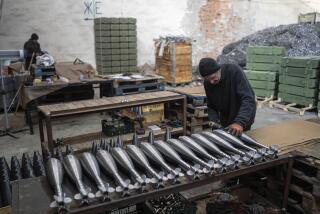NEWS ANALYSIS : Croats Want Firepower to Fight Off Serbs : Yugoslavia: Worried that U.N. troops won’t end war, they seek Western arms to regain occupied area.
- Share via
ZAGREB, Croatia — With Serbian occupiers vowing to foil U.N. plans to end the war in what used to be Yugoslavia, Croats contend that the only way to secure their territory is by combatting force with force.
Croatian officials, fighters and civilians believe that diplomatic recognition of their nation implies a right to deter an aggression that has already put one-third of their country under Serbian control.
Only by importing huge caches of weapons, they argue, will Croatia regain control of its prewar borders or stand a chance of repulsing further incursions by the Serbian-led federal army, navy or air force.
That view is shared by Croats abroad who have financed much of the resistance to date and by many in Western Europe who see the war that has so far cost 10,000 lives as a lopsided contest.
Monitors from the 12-nation European Community even recommended direct military assistance to Croatia in a report disclosed last month.
But other Western observers and military experts say more arms would only mean more deaths. They also worry that boosting Croatia’s firepower at this critical juncture could torpedo a Jan. 3 cease-fire that seems to be holding--barely.
Croats believe that the aggressors would be forced to retreat if confronted with the same military might now wielded by Serbs in the name of the Yugoslav army. But outsiders who have watched the vicious bloodletting of the past seven months worry that giving Croatia an equal destructive power might prove less of a deterrent than an enticement for revenge.
“You don’t put out a fire by pouring gasoline on it,” said one Western diplomat. “They need to talk more, not fight more. Weapons would only allow both sides to continue to seek a military solution instead of a negotiated one.”
Despite European allies’ advice that Croatia should refrain from appearing bellicose, military and political leaders say they are uncomfortable with the current arms imbalance.
“We truly need defensive weapons, which means all kinds of weapons to fight airplanes, armored vehicles and also so-called light technical weapons,” said Gen. Anton Tus, Croatia’s military chief of staff. “We’re not trying to get airplanes, but we need arms to fight enemy forces attacking us.”
Croatia currently has no aircraft except for a handful of old crop-dusters. Despite having the longest coastline of any of the six former Yugoslav republics, it has no navy and currently no right to inherit any of the Adriatic warships commanded from Belgrade. The nation of 5 million has an estimated 200 tanks seized from federal arsenals when the fighting first began, but it faces an opponent with at least 10 times that many.
“We need moral support from the West, but even more we need materiel,” said Rada Martinovic, a bookkeeper in the bombed-out city of Pakrac, echoing the sentiments of many of her countrymen. “Before everything, we need weapons. If we get them, there will be peace because we will have more strength.”
Stipe Mesic, head of Croatia’s ruling political party, said his country is counting on U.N. troops to sweep the federal army and Serbian guerrillas from occupied areas of Croatia.
Under terms of the U.N. plan, the federal army and non-local guerrillas would have to withdraw from Croatia as soon as the estimated 10,000 U.N. “blue helmets” arrived. Fighters living in three areas targeted for U.N. deployment would be demobilized, and all but local police would be disarmed.
Serbian President Slobodan Milosevic has agreed to the plan, as has Croatian President Franjo Tudjman. But Serbian rebel leaders have warned that they would rather “die honorably” by pressing the fight than cede Serbian enclaves to an independent Croatia.
“If the aggressive army retreats, there will be no need for new shipments of arms to Croatia,” Mesic said. “But if the Serbian army does not retreat, . . then Croatia will have to buy arms to achieve a final military success.”
Serbian militants, backed by the federal army, have been rebelling against Croatian independence for more than a year. They contend that Croatia’s 600,000 Serbs would be persecuted if separated from Serbia, citing the atrocities inflicted on ethnic Serbs during the time of the last independent Croatian state, the World War II-era Nazi puppet regime.
Like other officials in this Croatian capital, Mesic insisted that Croatia has the right to armed forces to defend itself. A U.N.-imposed embargo on weapons sales to combatants in the Yugoslav conflict no longer applies to Croatia now that it is a recognized country, Mesic said.
“Croatia can’t accept the embargo. Weapons are needed for defense,” insisted Bozidar Javorovic, a defense expert at the University of Zagreb. “They (Serbia and the army) have huge reserves in munitions and weapons.”
Javorovic estimated that only 30% of Croatia’s weapons are produced in the republic, with 20% having been funneled in--mostly illegally--by Croatian emigres from the West and the remaining 50% hijacked from federal army bases by Croatian forces.
About 30 countries have recognized Croatia this month.
But many governments, including that of Germany, which was Croatia’s strongest backer in the push for recognition, are forbidden by their constitutions to ship arms to volatile areas.
Tus, the military leader, conceded that export controls are likely to be tightened in those countries that have recognized Croatia so they can avoid accusations of taking sides and worsening the conflict.
“It’s clear that the Europeans have recognized the independence of Croatia, but the question is, within which borders?” said Trevor Taylor, an armaments expert at London’s Royal Institute for International Affairs. “Croatians want arms to recapture their pre-1991 borders. But I’m not sure even the Germans want to endorse that.”
Taylor said he believes that the U.N. embargo still applies to Croatia and that “any arms supplies at all into Croatia or Serbia at this stage would not be a good idea.”
“The two parties, the Serbs and the Croats, seem to be facing a political question--whether to resolve their differences by violence or by negotiation,” he concluded. “If they choose to resolve them by violence, no matter how arms are supplied, the costs will be very high in human misery.”
More to Read
Sign up for Essential California
The most important California stories and recommendations in your inbox every morning.
You may occasionally receive promotional content from the Los Angeles Times.














